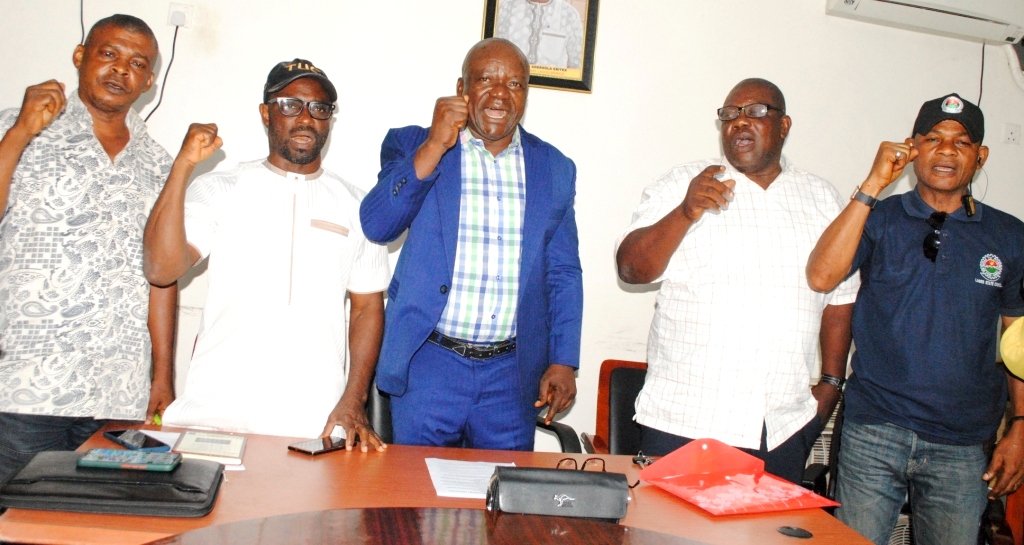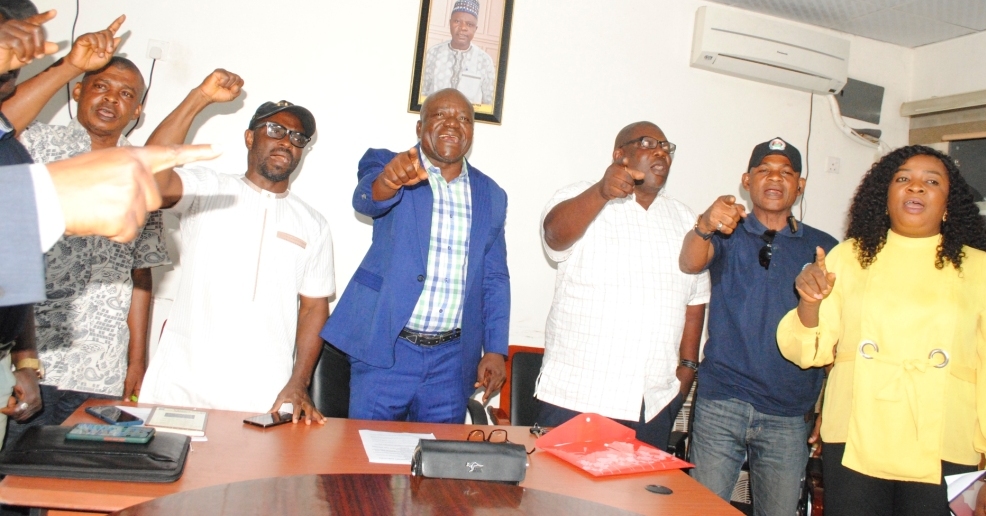Aviation unions kick against plans by FG to stamp out union activities in the industry


Services Senior Staff Association of Nigeria (ATSSAN), Comrade Francis
Akinjole; General Secretary, National Union of Air Transport Employees
(NUATE), Comdr. Ocheme Aba; Member, NAAPE, Engr. Wale Adenugba;
Amalgamated Union of Public Corporate, Comrade Babtunde Omotola and
Comrade Ogochukwu Ibegbunam, during the World Press Conference in Lagos. PHOTO
SUNDAY ESHIET.
Aviation unions in Nigeria have exposed plans by the Federal Government to stamp out union activities in the industry, citing “obnoxious clauses” allegedly woven into the newly passed Aviation Bill.
Expressing their grievances to journalists in Lagos during the week, the unions, which include the Air Transport Senior Staff Services Association of Nigeria (ATSSSAN), National Union of Air Traffic Employees (NUATE), Association of Nigerian Aviation Professionals (ANAP) and the National Association of Aircraft Pilots and Engineers (NAAPE), said the government was acting under a false claim that aviation workers offer essential services, and should not embark on strike.
According to the General Secretary of NUATE, Comrade Ocheme Aba, the obnoxious clauses include: “1(1) All services which facilitate and maintain the Smooth, orderly and safe take-off, flight and landing of aircraft, embarkation and disembarkation and evacuation of passengers and cargo respectively in all aerodromes in Nigeria are hereby designated as essential services pursuant to the provisions of Section 11(1) of the Constitution of the Federal Republic of Nigeria, 1999 (as altered).
“(2) The Minister may by regulations prohibit all or such class or classes of workers, officers and other employees or persons whether corporate or natural, engaged in the provision of services specified in subsection (1) of this section from taking part in a strike or other industrial action.
“2(1) The provisions of the Trade Disputes (Essential Services) Act, Cap. T9, Laws of the Federation of Nigeria, 2004 shall apply to service in the Agency, facilities managed by the Agency and in the implementation of this Bill.
“(2) There shall be no strikes, lock-outs, pickets, blockades, service disruptions, etc of any kind within all facilities managed by the Agency and where any labour dispute arises, such dispute shall be resolved by the Agency.”
If the above clauses are successfully promulgated into law, Ocheme said the legislation would grant powers to the minister of aviation to regulate trade unions and workers in contradiction to the Trade Unions Act, 2004 which grants the minister of labour sole regulatory powers over trade union and industrial relations matters in Nigeria.
“This collision is very atrocious if it is extended into the arena whereby every sector may decide to make its minister the regulator of trade unions in their respective sectors. The chaos that would ensue can only be imagined,” he said.
The unionist said the designation of services rendered by the aviation agencies as “essential services” in the Bills in which industrial action is prohibited did not come up for discussion at any time during the processes of the bills of any of the agencies.
“During the public hearings in the aviation committee of the house of representatives, issue of essential service was responded to by the national president of NAAPE who drew attention to a National Industrial Court ruling on the matter, to the effect that airlines do not render essential services. As far as we were concerned, the matter rested at that, as no member of the public, in particular, canvassed any such position.
“More disturbingly, the subject of essential services did not feature in any of the deliberations of either committee of the national assembly in the course of making any of the six bills in question, as national assembly records show,” he said.
He described as “baffling” how the clauses found their way “surreptitiously” into the bills.
He added: “The classification of all services rendered by the aviation agencies as essential services is flagrantly fallacious and very clearly disagreeable.
“We posit that the services provided by aviation agencies are not entirely essential.
“As a matter of fact, their services are largely non-essential. And this fact has already been catered for by the Trade Disputes (Essential Services) Act, 2004 which provides more than enough guidance on the subject.”
According to him, the International Labour Organisation (ILO) committee of experts on the application of conventions and recommendations defines essential services as those “the interruption of which would endanger life, personal safety and health of the whole or part of the population”.
On this basis, he quoted the Digest of Decisions and Principles of the Freedom of Association Committee of the Governing Body of the ILO (1996), Fourth (revised) edition as listing essential services as those provided in the “hospital sector, electricity services, water supply services, telephone services, air traffic control”.
He said transport, generally, is listed among the services that do not constitute essential services and to which prohibition of strike does not pertain.
“Riding on the above, the Hon. Justice E. N. Agbakoba in the case no NICN/LA/120/2013 (Aero Contractors Ltd VS National Association of Aircraft Pilots and others) on 4th February 2014 held that the Airline does not render essential services, any different from Ekene Dili Chukwu or any other transport company; except any staff who renders air traffic service. As such the Hon. Justice ruled that the unions have right to carry out strike action against the Airline,” he said.
Ocheme said the basis of the entire obnoxious clauses under question is for the purpose of preventing the unions to engage in strikes that prevent flight operations as evidenced in the ILO convention and Justice Agbakoba’s submission.
Ocheme said as the leadership of the senate and house committees on aviation had denied knowledge of the clauses in the bills, those who smuggled the clauses into the bills transmitted to the president for assent should be exposed and punished.
“Being in heavy conflict with prevailing national and international laws (as ratified by Nigeria), the obnoxious clauses cannot find a hiding place in an aviation conclave.
“As such the National Assembly has no choice than to recall the bills and expunge the clauses in contention,” he added.
To demonstrate the unions’ resolve against the clauses, Ocheme said all the state organs of the unions should be ready to carry out peaceful public demonstrations at all airports nationwide on Monday, September 12, 2022.
“Should the situation remain not ameliorated beyond fourteen days after the demonstrations, then our unions shall embark on total industrial action to press home our demands,” Ocheme added.







